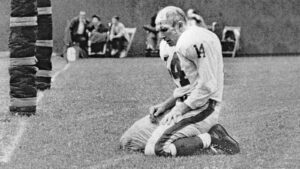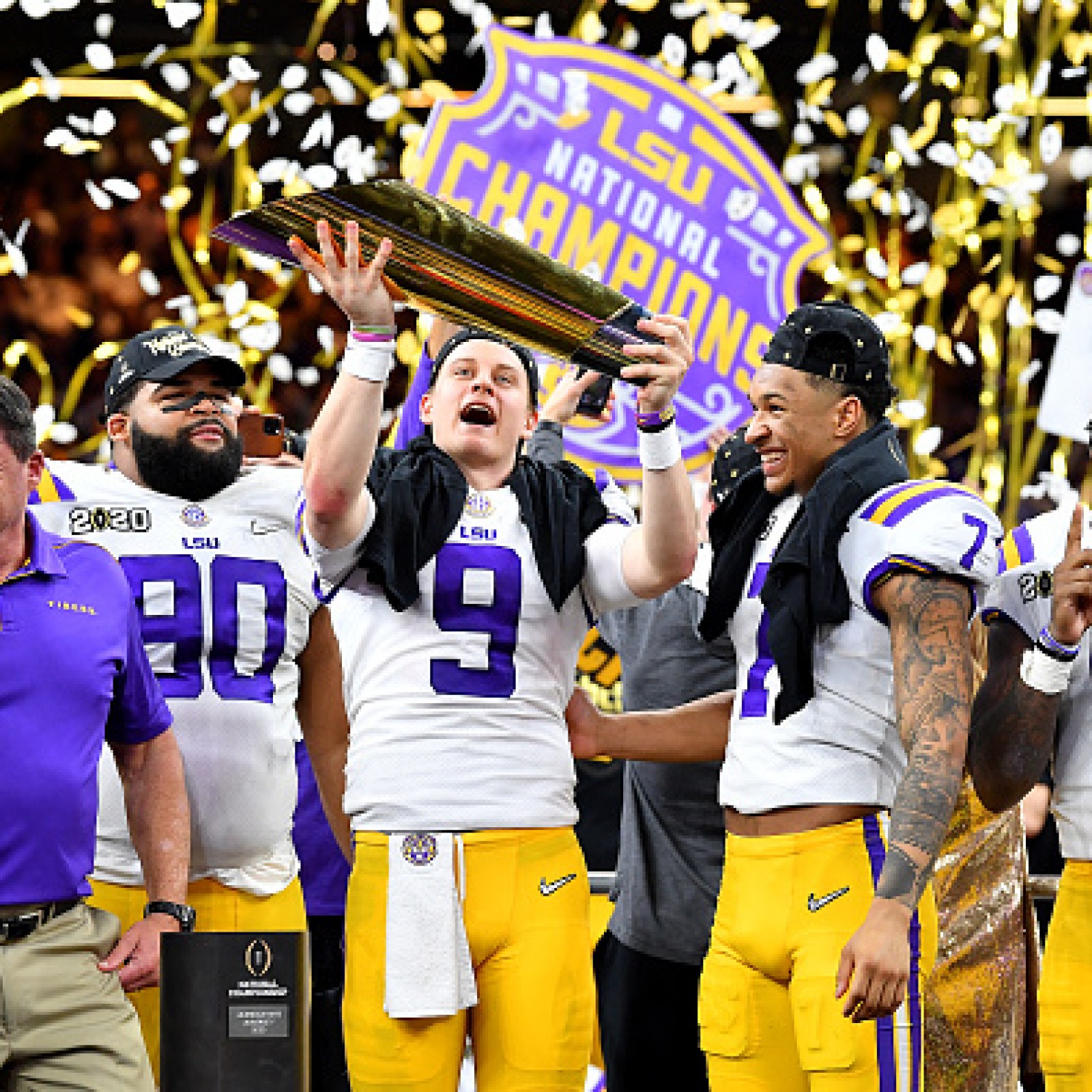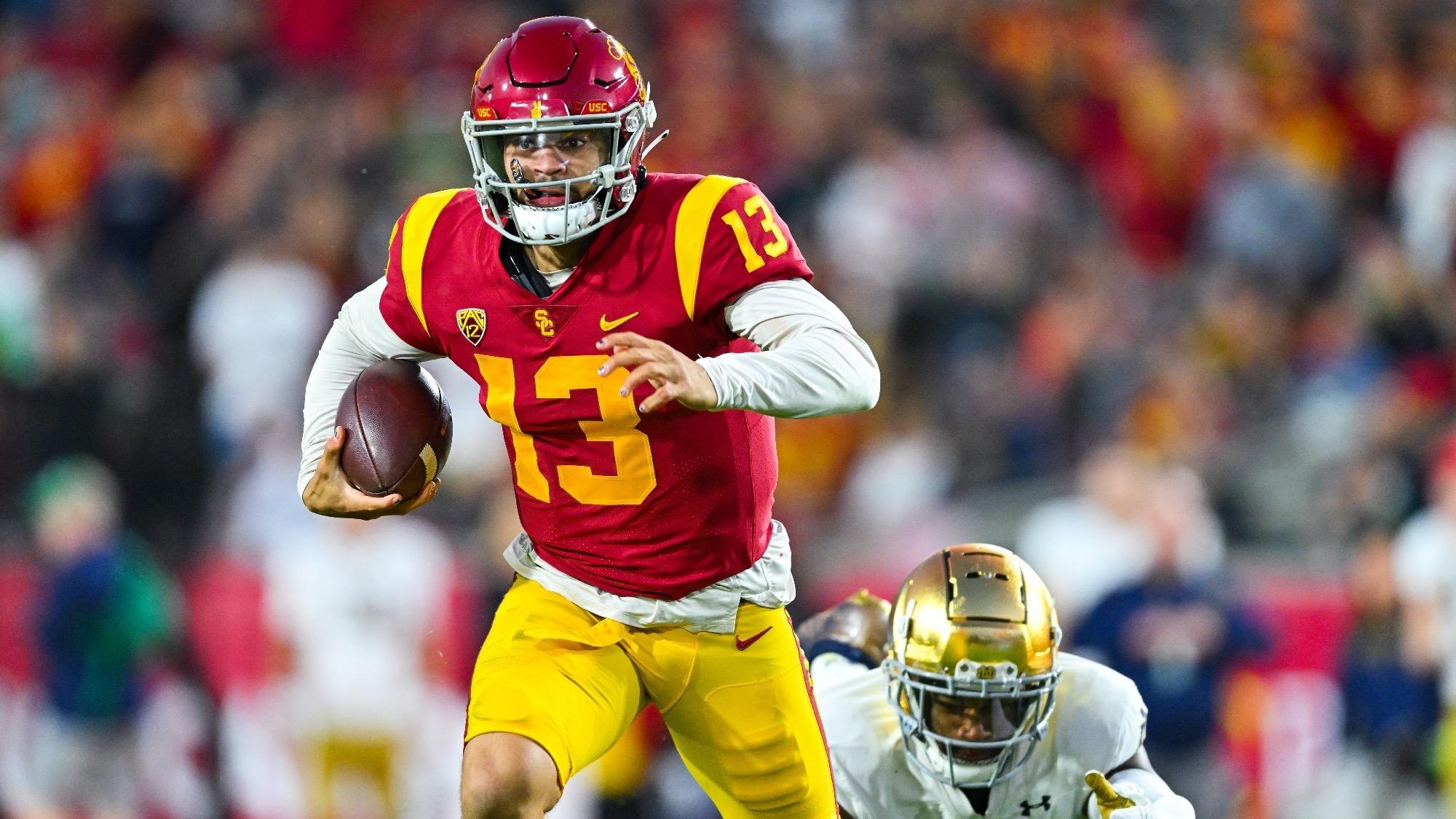The LSU football program has produced a strong legacy of quarterbacks who have made a tremendous impact on pro football. The group has been well represented in the NFL Draft, has won league rookie of the year honors, NFL MVP awards and has led teams to Super Bowl appearances.
In this article, we’ll explore the top passers in LSU Football history that have produced great results for the NFL franchises they played for. We’ll also spotlight a Big Miss that was destined to be on this list.
Y.A. Tittle – From LSU to Hall of Fame QB
Marshall, Texas native Y.A. Tittle is a legendary figure in football circles, with his career spanning from playing as the LSU quarterback from 1944 to 1947 all the way to being inducted into the Pro Football Hall of Fame in 1971. Let’s explore how this incredible athlete made it from college football in Baton Rouge to NFL stardom and beyond.
The College Years
Y.A. Tittle’s college football years were spent at Louisiana State University, where he played quarterback for the Tigers from 1944 to 1947, earning First Team All-SEC honors in 1946 and 1947. After graduating from LSU, Tittle was drafted by the Detroit Lions
From Cover Boy to Canton
Fortunately for Tittle, he never actually ended up playing for the Lions. Instead, he started his career with the Baltimore Colts in 1950 and earned AAFC Rookie of the Year honors that season. When the Colts franchise folded after that season, Tittle found himself back in the draft pool and picked up by San Francisco where he quickly established himself as one of the league’s best players.
He earned Pro Bowl honors during his time with the 49ers and even became Sports Illustrated’s first ever QB cover model! After 10 years with San Francisco, Tittle was traded to New York Giants where he played from 1961-1964, eventually winning NFL MVP award in 1963 and earning Hall of Fame recognition later on.
Along with his 1971 induction into the Pro Football Hall of Fame, the 3-time NFL First Team All-Pro was named to the New York Giants Ring of Honor and to the 49ers Hall of Fame. The Giants also retired his No. 14 jersey.

Y.A. Tittle was also captured in a famous NFL photo during his final season. The image shows him kneeling in the end zone at old Pitt Stadium. Tittle had thrown a pick-six and received a concussion and broken sternum during the play.
Tittle served as an assistant coach with the 49ers after retirement and also founded the Y.A. Tittle Insurance & Financial Services Company. He passed away in 2017 at the age of 90.

For a tremendous lineup of LSU Gear. Find jerseys, caps, and gameday gear to get you ready for an exciting night at Tiger Stadium.
Remembering Bert Jones’ Brilliance on the Football Field
Bert Jones was an LSU legend, and one of the greatest quarterbacks to ever play in the NFL. A native of Ruston, Louisiana, Jones spent three seasons at LSU (1970-1972) sharing time with Paul Lyons until his senior season when he earned consensus All-American honors and finished fourth in Heisman Trophy voting. In 1973, he was selected No. 2 overall by the Baltimore Colts in the 1973 NFL Draft and would go on to have a storied career that included NFL MVP honors in 1976. Let’s take a look back at his legendary career.
NFL Career with the Colts
Jones’ career with the Colts got off to a great start – he started all 14 games of his rookie season, threw for over 2,900 yards and 20 touchdowns (both franchise records), and led them to their first postseason appearance since 1971. Under his direction, they won three consecutive AFC titles from 1975-1977 but unfortunately lost each opening round of playoffs during this period due to bad luck or ill-timed injuries.
Jones was named NFL MVP in 1976 after throwing for 3,104 yards and 24 touchdowns that season but suffered a separated shoulder injury during in a preseason game prior to 1977 campaign which hampered his play significantly over next few years with Colts organization before being traded away after 1981 season. Jones first and only season with the Los Angles Rams was limited to four games when he retired due to a neck injury.
David Woodley, the Man In Between the Eras of NFL Greats

David Woodley was a standout LSU quarterback from 1977-1979. He shared playing time with Steve Ensminger and led the Tigers to a 34–10 Tangerine Bowl victory over Wake Forest in his final college game. After being drafted in the 8th round of the 1980 draft by the Miami Dolphins, Woodley is best known as the bridge between two Hall of Fame quarterbacks, Bob Griese and Dan Marino. Let’s break down what makes David Woodley such an important figure in NFL history.
Rookie Success with Miami Dolphins
Woodley was initially fourth on the depth chart for Miami but wound up being elected team MVP for his rookie season in 1980. The next year he led Miami to the Super Bowl, but they were unable to capture a championship title that season. 1982 was a strike-shortened season, making it one of Woodley’s most remarkable seasons as a professional athlete. He finished with 2,743 yards passing and a career-high 18 touchdowns that season and was selected to play in his first Pro Bowl at its conclusion. The following year saw struggles for both Woodley and the entire Miami offense which resulted in him losing his starting job to Dan Marino after week six of that season.
Career Ends in Pittsburgh
Prior to the 1984 season, David Woodley was traded to Pittsburgh where he split time with Mark Malone as quarterback for two seasons before retiring from professional football due to chronic shoulder problems.
Woodley’s life ended in 2003 from complications due to kidney and liver failure on May 4, 2003. His death in his hometown of Shreveport, LA, was twenty years after Super Bowl XVII. Woodley became the youngest Super Bowl starting quarterback to die.
Joe Burrow’s Historic NFL Journey
Although Joe Burrow began his college football journey at Ohio State, his rise to stardom began when he transferred to the Tigers. Much to the delight of LSU fans, Burrow’s record-breaking 2019 season not only culminated in a Heisman Trophy, but it also helped deliver the fourth football national championship in LSU history.

After being drafted No. 1 by the Cincinnati Bengals in 2020, Burrow was having an impressive rookie season until a season-ending knee injury cut it short. But that didn’t keep him down; he returned with renewed vigor in 2021 and earned the NFL Comeback Player of the Year while leading the Bengals to an AFC Championship and Super Bowl appearance. Following that Super Bowl loss, Burrow has continued to emerge as one of the league’s best QBs.
JaMarcus Russell – What Might Have Been
Russell played for LSU from (2004-2006) and started his final two seasons in Baton Rouge. The 6 ft 6 in quarterback was a physical specimen and wowed NFL scouts with his tremendous arm strength. Those tangibles elevated draft status and he became the first LSU quarterback to be drafted with the first selection of the NFL Draft.
JaMarcus Russell’s career with the Raiders was a fascinating one. Initially seen as a potential franchise quarterback, he was selected by Oakland in the 2007 NFL Draft as the first overall pick. However, after three years of struggles and never living up to expectations, his time with the Raiders ended abruptly.
On July 25th, 2010 JaMarcus was released from Oakland after failing to make any tangible progress on or off the field since being drafted just a few short years prior. His style of play had quickly become outdated in today’s explosive offensive schematics and that ultimately led to his release. Despite being given numerous opportunities to improve and make an impact, JaMarcus “couldn’t keep hold of his job” according to then-Raiders coach Tom Cable who openly expressed regret at not having higher expectations for the former LSU quarterback when they drafted him in 2007.
His downfall can be attributed largely to his poor work ethic both in practice and about tending to off-the-field issues like weight loss which impaired his physical abilities. With no incentive structures built into Russell’s contract despite being the first overall pick, he didn’t feel strongly enough compelled take responsibility for his own habits that were detrimental to success on or off the field leading him down this path instead of going onto bigger things like so many number 1 picks before he had done successfully previously.
LSU Football Helmet History & Authentic & Replica Helmets for
Learn about the history of the iconic LSU football helmet and shop from an extensive range of replica and authentic…
LSU National Championships
LSU Has Displayed a Championship Eye of the Tiger In more than 130 years of playing football, LSU National Championships have…
Schools With The Most Heisman Trophy Winners
Since Chicago’s Jay Berwanger was recognized as the most outstanding college football player in 1935 as the first Heisman Memorial…


